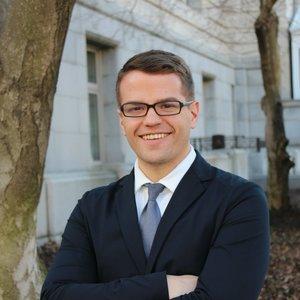
By David Yokum, J.D., Ph.D., Director, The Lab @ DC
There’s a movement underway to integrate scientific research into the everyday workings of government at all levels. Increasingly, research professionals are being called upon to roll up their sleeves and lend their advice, expertise, and knowledge in service to government. Here in the District of Columbia, Mayor Muriel Bowser established The Lab @ DC, a team to work with a wide range of city agencies. The Lab uses scientific insights and methods to test and improve policies and provide timely, relevant, and high quality-analysis to inform DC’s most important decisions.
In building the team—which now includes over 20 employees, fellows, and regular collaborators—Mayor Bowser made the explicit decision to make social and behavioral science expertise central. We have scientists with PhDs in anthropology, sociology, economics, and psychological science who work in Washington, DC’s city hall addressing some of our biggest challenges. These social scientists work closely with other experts on the team, such as data scientists and operations experts, to ensure that solutions are theoretically sound, methodologically rigorous, and carried out efficiently and effectively. Importantly, team members are “embedded” in city government, which allows them to build relationships with other city employees as well as the citizens they serve.
Social science is central to The Lab’s operations because, as COSSA can tell you (and as I’ve written about before), humans are central to some of society’s—and Washington, DC’s—biggest challenges. In one of our projects, for example, we studied the effects of police body-worn cameras in local policing. We began this project recognizing that many jurisdictions are considering police cameras as a means to improve police-community relations, despite limited evidence as to whether cameras actually do improve relations.
We randomly assigned police officers to wear or not wear cameras, and measured the differences in behaviors that emerged. Contrary to some expectations, we found that wearing a body camera actually had no statistically significant effect on important measures of interest, including police use of force, civilian complaints filed against police, or the rate of police arrests of disorderly conduct. You can read more about our study and the results here. Continued work studying the effects of body worn cameras is ongoing.
The other work we do is similarly pervaded by behavioral and social science. In one project, for instance, we collaborated with DC Fire and Emergency Medical Services to study the effect of a nurse triage line, dedicated to improving patient care and eliminating emergency room overcrowding. We’re also investigating behavioral “nudges” that can be used to increase the likelihood that needy families will correctly indicate their need for available financial aid. In these cases and others, social science informs our theories, influences the methodologies we use, and inspires future directions for research and application. We would not be able to tackle these challenges without social science’s toolbox.
An aside worth mentioning: Social scientists have also been leaders science-wide in advocating for rigor and reproducibility in science. That’s why we post all of our pre-analysis plans (sometimes called preregistrations) before the work begins and make them publicly available on the Open Science Framework. This allows everyone to see what we intended to study and what our predictions were, before we begin to collect data or conduct analyses. Click here to see our pre-analysis plans. In cases where it’s ethically and legally appropriate, we also make our data and materials publicly available, too.
Of course, in many cases we are not able to collect data ourselves, as an experimenter might be able to do in a university laboratory. To answer many questions, we make use of administrative data. These are the data that are generated in the routine processes of everyday government; a “byproduct,” if you will. However, being able to use administrative data makes answering some research questions very cost-effective. This means that we are potentially able to determine solutions that save DC residents’ tax dollars and make DC programs more efficient.
Intrigued by The Lab’s work? If you’d like to learn more about us and what we’re doing, there are many ways to engage. Please visit our website: thelab.dc.gov. From there, you can sign up for our email newsletter, learn about upcoming events happening in DC and elsewhere, and listen to one of our newer initiatives: The Podcast @ DC, featuring interviews with social science researchers, practitioners, and others about some of DC’s unique challenges and promises.
It’s simple—the answer to “Why Social Science?” is that it can improve the lives of city residents. Thanks for reading, and we hope to see you at a future Lab event or tuning in to our podcast very soon.
DAVID YOKUM is Director of The Lab @ DC. Under his leadership, The Lab conducts applied research projects to generate timely, relevant, and high-quality evidence that informs the District’s most important decisions. He hosts The Podcast @ DC, featuring conversations that bridge the gap between research and practice in government. David was previously a founding member of the White House’s Social & Behavioral Sciences Team and Director of its scientific delivery unit housed at the U.S. General Services Administration. He earned a Ph.D. in psychology and a law degree.